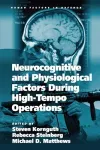
Neurocognitive and Physiological Factors During High-Tempo Operations
Rebecca Steinberg - Paperback
£56.99
Dr. Steve Kornguth is the Director of the Center for Strategic and Innovative Technologies and Biological and Chemical Defense, Institute for Advanced Technology at The University of Texas at Austin. He is also Professor in the Department of Pharmacy at The University of Texas at Austin and Professor Emeritus in the Departments of Neurology and Biomolecular Chemistry at The University of Wisconsin at Madison. Additionally he is a member of the Army Science Board. Dr. Kornguth's research at Wisconsin related to neural development, autoimmune diseases and development of binding agents and platforms for sensors and magnetic resonance image contrast materials. His research efforts at Austin relate to sustaining high-tempo operations performance of soldiers and developing technologies for defense against biological threats. Dr. Kornguth has also established a team of researchers from UT Austin, Baylor College of Medicine, The US Military Academy, Army Research Laboratory/HRED, and the Iron Horse Brigade (1 BCT) First Brigade Combat Team of the First Cavalry Division, to investigate the physical and cognitive correlates of high-tempo operations activity. This research includes identifying the neurophysiological markers of attentiveness, monitoring brain activity during periods of high and low vigilance, and implementing novel protocols to improve performance in high-tempo environments. Dr. Rebecca Steinberg is Program Manager and Postdoctoral Fellow in the Center for Strategic and Innovative Technologies (CSIT) and the Institute for Advanced Technology (IAT) at the University of Texas at Austin. She oversees and contributes to a multidisciplinary multi-institutional study examining the effects of 36 hours' total sleep deprivation on cognition and physical performance of US military cadets, soldiers, and University of Texas undergraduates. Rebecca publishes a monthly newsletter detailing recent findings in the field of human performance, which can be found online at http://www.csit.utexas.edu/newsletter/newsletter.lasso. Rebecca received her PhD in Neuroscience from the University of Texas at Austin, 2007, with a focus on neuroendocrinology and toxicology/pharmacology. Her dissertation research examined the effects of environmental pollutant exposure across multiple generations using hormone assays, immunocytochemistry, behavior, and gene expression arrays. Dr. Michael D. Matthews is currently Professor of Engineering Psychology at the United States Military Academy, where he serves as Director of the Engineering Psychology Program. He is a former Air Force officer with tours of duty at the US Air Force Human Resources Laboratory and as a faculty member at the US Air Force Academy. Dr. Matthews was selected as a Templeton Foundation Positive Psychology Fellow and much of his research focuses on applying Positive Psychology principles to military contexts. He is on the science advisory board for the Military Child Education Coalition, and served as President of the American Psychological Association's Division of Military Psychology from 2007 to 2008. Collectively, his research interests center on soldier performance in combat and other dangerous contexts.